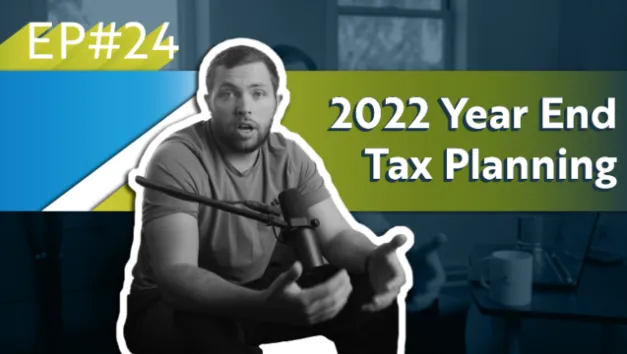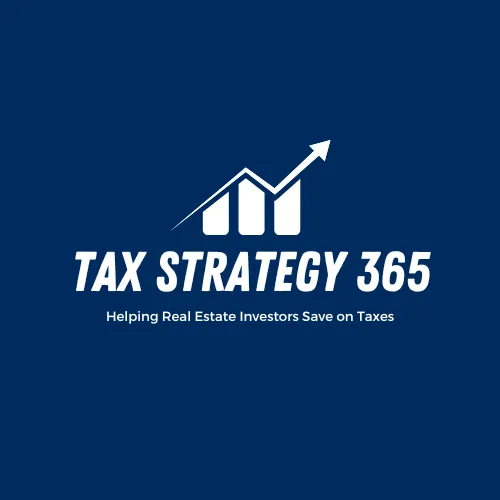Latest blogs and articles
Leading you to a better financial future.

Your Year-End Tax Planning Handbook
Your Year-End Tax Planning Handbook
Taxes are obviously on everybody’s mind when it comes to investing for your financial future. That’s why it’s important to take advantage of any year-end tax planning opportunities to reduce your tax burden, free up cash, and even get a sizable return.
Check out these 6 tax planning opportunities you can explore before the new year.
1. Roth Conversions
With the recent downturn in the stock market, this is a great year for Roth conversions. A Roth conversion is where you have money set aside in a retirement account such as a traditional IRA or a traditional 401(k). A Roth conversion entails that you take that pre-tax money, convert it over to a Roth account, and pay the taxes on it upfront. By doing this, it's going to grow tax-free for the rest of your life AND you’ll save money.
Let's say you had $10,000 of traditional pre-tax money invested. You got a tax deduction of $10,000, but now your accounts are only worth $7,000 - $8,000. If you're able to convert that traditional money over to Roth at $7,000 - $8,000 instead of the $10,000, you're able to save money in taxes over the long time because you got your tax deduction at $10,000. That money is going to grow tax-free for the rest of your life.
A Word of Caution: Marginal Tax Brackets
Roth conversions are a great tax strategy, but you should be very cautious of where your marginal tax bracket is at.
Your marginal tax bracket represents the amount of tax that you pay on every single additional dollar that you make. Be very cautious of your brackets, especially if you're in the 24% - 32% range, as well as the 12% - 22% range. For example, a single person earning up to $170,000 is in a 24% tax bracket. As soon as they made more than $170,000, they jumped from a 24% up to a 32% tax bracket.
The ideal strategy would be covered up to that amount but nothing further and then look to maybe convert it the following year when your tax bracket resets.
2. 100% Bonus Depreciation
2022 is the last year for 100% bonus depreciation on your properties. If we currently have assets such as short-term rentals, we want to take advantage of the 100% bonus depreciation this year because it's going to be worth 20% more than if we were to take advantage of it next year.
In 2023, bonus depreciation is going to drop down to 80%. By 2024, it’s going to go down to 60%, and then ultimately it's going to go down to zero. Therefore, take advantage now before this opportunity expires.
3. Check Form 8582 for passive activity losses
Form 8582 on your tax return represents the amount of rental income that you can make without being taxed - which makes it the most important form if you're a real estate investor.
You’ll want to check your Form 8582 for passive activity losses. Instead of utilizing other creative strategies to offset losses, it may already be covered because of their carry forward losses.
Check your form to see how much income you can make in the rental real estate space without having to pay taxes. The cool part about these carry forward losses is that a passive activity loss will offset any form of passive activity gain. So maybe you have $200,000 of carry forward losses and you have $100,000 rental income coming in this year. That $200,000 of losses are going to offset your $100,000 of rental income coming in, you're not going to pay taxes on it.
4. Perform a tax projection to make changes to your estimated tax
For people who are working in tech, sales jobs, and commission-based jobs, it’s important to check your withholdings and do a tax projection to see where your income is. This is especially true for those that receive stock compensation, employee stock plans, and other sources of income.
Do a real good job of projecting out what your tax liability is going to be. For example, employees with stock options end up owing money because those stock options are never withheld at the proper rate that they need to be. Or, maybe an investor is currently at a 37% tax bracket, but their company is only withholding at 22%. This creates a very big problem when you're talking about six-figure income, as come tax time, they end up owing $20,000+ checks!
5. Defer your income, accelerate your expenses!
Another great strategy is defer any income until next year, while also accelerating any expenses that would otherwise land in the following tax year.
How can we defer an income event as long as possible and accelerate your expenses for this year? Here’s a few common examples:
When financing a vehicle, get the tax deduction this year and pay that off over the course of the car. If you’re in the 37% tax bracket, and you buy a $50,000 vehicle, you’ll receive $18,500 in the year that you buy that vehicle. In many instances, that $18,500 tax savings is going to be more than the down payment on the vehicle. If you lease the vehicle, however, you're only able to write off the lease payment.
Look at your vendor list, and pay them for services or products that you're going to need in 2023 before the end of 2022. Prepay your contractors, your vendors, your tax advisor, and others even though you're not using the service until the following year. This enables you to reduce money that you would otherwise already be spending and also gain an early tax benefit for 2022.
Other ways to also defer income and accelerate expenses include:
Accelerated depreciation
1031 exchanges
Seller finance deals
6. Wash sale losses
If you have a taxable brokerage account where you initially invested $100,000 and now it's only worth $80,000, selling it at a $20,000 loss enables you to use that loss to offset gains you have elsewhere, such as on rental properties or some business sale.
You lock in those losses now and be very careful of the wash sale rule. To do so, you can sell that account, claim the loss, and buy back into something similar to register that loss while not changing your investment portfolio.
As you can see, there’s plenty of strategies to reduce your tax burden before the end of the year. By implementing the six strategies mentioned in this overview and the LearnLikeaCPA podcast, you can free up more cash for more opportunities.
Your Year-End Tax Planning Handbook
Join my Facebook group with over 9,000 real estate investors!

Choose Your Journey to Tax Excellence
Journey 1
Building a Tax Advisory & Consulting Practice
Scale, streamline, and systemize your advisory business.
Turn compliance clients into year-round advisory opportunities while mastering operational efficiencies for sustainable growth. This track covers pricing, hiring, marketing, and client engagement essentials to help you build a practice you love.
WHAT YOU’LL LEARN:
Crafting solid engagement letters and pricing models.
Transforming compliance clients into year-round
partners.
Marketing
strategies that drive consistent growth.
Recruiting and training the right team to scale your business.
Bonus:A Power Checklist for the ultimate year-end tax planning session.
Journey 2
Tax and Legal Foundations: Core Strategies for All Levels
Master the fundamentals that drive financial success.
Perfect for business owners and advisors, this track delivers essential insights on asset protection, tax planning, estate strategies, and IRS compliance.
WHAT YOU’LL LEARN:
Unlock estate planning with Revocable Living Trusts.
Maximize retirement savings through Solo 401(k) plans.
Real estate strategies: Short-term, long-term, and self-rentals.
Learn asset protection that actually works.
Navigate IRS resolution with confidence and ease.
Journey 3
Advanced Insights: Unlock Complex Tax Strategies
Top-tier strategies for high-value clients.
Designed for experienced professionals, this track offers in-depth guidance on prime tax strategies, entity structuring, and payroll solutions. Gain the insights needed to handle complex business scenarios with confidence.
WHAT YOU’LL LEARN:
Report multi-entity structures with Forms 1065 & 1120S.
Maximize tax savings using Bonus Depreciation & Section 179.
Seamlessly relocate clients to tax-free states.
Navigate business sales and acquisitions smoothly.
Use 105 Plans to save clients on healthcare costs.

2024 Learn Like A CPA. All rights reserved.